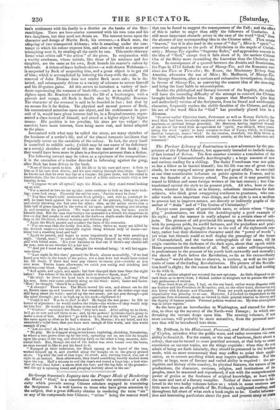Sir George Staunton's Inquiry into the Proper Mode of Rendering
the Word "God," is a contribution towards the settlement of a diffi- culty which prevails among Chinese scholars engaged in translating the Scriptures. It is well known to those who have given attention to the subject, that a great difficulty obtains in rendering the term "sin" or any of its compounds into Chinese ; "crime" being the nearest word that can be found to suggest the consequences of the Fall; and the effect of this is rather to anger than edify the followers of Confucius. A still more important obstacle arises in the case of the word "God," finm the absence of any corresponding idea in the Chinese mind. Tien means "heaven," but it is also used in the sense of "day"; Skin is "spirit".... somewhat analogous to the gods of Polytheism or the angels of Christi. airily; Shang- Tee signifies "Supreme Ruler," and approaches nearest ;0 the idea of "God," except that it falls short of it, the ancient Chinese idea of the Deity more resembling the Lncretian than the Christian no- tion, In consequence of a quarrel between the Jesuits and Dominicans, the Pope in 1715 forbade the use of Shang-Tee, and the Romanist ver- sions use Tien or Tien-Mu; Dr. Boone, the Missionary Bishop from America, advocates the use of Shin; Mr. Medhurst, of Shang-Tee. Sir George Staunton, after a curious and exhaustive investigation, decides in favour of Shang-Tee, as conveying the nearest idea of the meaning, and being the least liable to misconception. Besides the philological and literary interest of the Inquiry, the reader will have the exceeding difficulty of the attempt to convert the Chinese brought incidentally before him. It appears that Morrison's (the first and authorized) version of the Scriptures from its literal and unidiomatic character, frequently excites the risible faculties of the Chinese, and that his use of the word Shin for "God" has peculiarly placed him in a dilemma.
"In every earlier Christian tract, Protestant as well as Roman Catholic, the word Shin had been invariably employed either to denote the false gods of the heathens, or spiritual beings generally. Dr. Morrison having deprived himself of the use of the word Shin as equivalent for was obliged, when trans- lating the word spirit,' to have recourse to that of Fang; which, in Chinese familiar language, means 'wind.' In his version, therefore, the Holy Ghost is the 'holy wind,'—a phrase which certainly sounds, at the least, indecorous and irreverent."


























 Previous page
Previous page